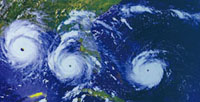New research center aims for better hurricane forecasts
Scientists at a new research institute are studying ways to improve hurricane forecasts and protect the U.S. Gulf Coast's natural resources from storms, the National Oceanic and Atmospheric Administration announced Thursday.

The federally funded Northern Gulf Institute at Stennis Space Center joins dozens of researchers who also study ecosystem management, coastal wetlands, climate change and coastal hazards in and around the Gulf of Mexico, the agency said.
The institute's mission is to tackle "some of the largest challenges that we face in our environment, in the country, in the world," more than a year after Hurricane Katrina devastated the coast, said NOAA Administrator Conrad Lautenbacher Jr.
"You cannot do it with individual organizations and with individual researchers," he said. "You have to come together if you're going to solve the problem of climate change and climate variability in our communities."
The new institute, one of 21 such NOAA-supported research programs across the country, is teaming up scientists from Mississippi State University, the University of Southern Mississippi, Louisiana State University, Florida State University and Dauphin Island Sea Lab in Alabama.
Dr. David Shaw, the institute's director, said $6.5 million (Ђ5.1 million) in federal funding this year will allow scientists at Stennis, a NASA research and testing facility, to greatly expand the scope of existing research projects, like one that seeks to improve hurricane forecasts, reports AP.
"One of the things we've talked about is how we can move from a 72-hour forecast, with a high degree of confidence and accuracy, to a 96-hour forecast," he said. "Just that extra 24-hour period of time can make a world of difference in terms of evacuations and frankly help us avoid evacuations that were not necessary."
Subscribe to Pravda.Ru Telegram channel, Facebook, RSS!




